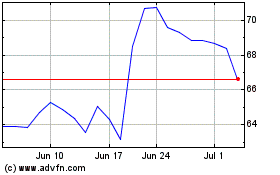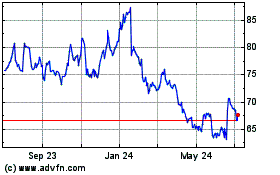InterMune Faces Tough Decisions, Long Wait, For Lung Drug
May 05 2010 - 5:09PM
Dow Jones News
The Food and Drug Administration's rejection of InterMune Inc.'s
(ITMN) lung treatment pirfenidone until further testing creates a
lot of uncertainty for the company and investors, and for patients,
many of whom have only a few years to live.
If the Brisbane, Calif., company chooses to keep developing the
drug, it likely will have to conduct a multiyear study to show the
drug's effectiveness, something that increases the clinical and
commercial risk. The FDA's decision likely means the drug won't be
available until 2013 at the earliest and further delays the first
treatment of the fatal condition known as idiopathic pulmonary
fibrosis.
"It's devastating news," said Teresa Barnes, vice president of
patient outreach and advocacy at the Coalition for Pulmonary
Fibrosis, noting that waiting for another trial isn't an option for
many. "Frankly, a lot of patients will be dead by then."
InterMune will meet with the FDA "as soon as possible to
understand their points of view and to determine the most
appropriate path forward," spokesman Jim Goff said. He declined to
comment on the company's commitment to developing pirfenidone, but
he noted that there is a European regulatory decision coming in the
first half of 2011.
Industry observers are doubtful about European approval after
the FDA's decision, news of which reduced InterMune's valuation by
three-quarters to $630 million.
The setback shouldn't be the end of InterMune. The company
already sells Actimmune, which had $25.4 million in sales last year
as treatment for an immune system disorder and bone disease.
InterMune also is developing a hepatitis C drug with Roche Holding
AG (RHHBY).
The company, though, may need to raise cash to conduct another
clinical trial.
Some investors may look to the past struggles of Dendreon Corp.
(DNDN) for encouragement. That drug maker's stock more than tripled
when an FDA panel recommended approval of its prostate cancer drug
Provenge, but it plummeted 70% when the agency rejected the
application and asked for more data.
That request occurred almost exactly three years ago, but
Dendreon worked with the agency and conducted another late-stage
trial to prove the effectiveness of Provenge, which was approved
last week. The stock is now at all-time highs.
Like Dendreon, InterMune is looking to treat patients with no
remaining options, and the payout--many projected pirfenidone to
have sales exceeding $1 billion--could be huge.
But the need for an additional clinical trial adds a substantial
amount of risk for the company and investors. There is no assurance
that a new study will prove successful, especially if the trial
calls for the more difficult measure of patient survival.
The previous late-stage trials used a measure called forced
vital capacity, a measure of lung function, and one of them failed
to prove the effectiveness of the drug.
Aside from clinical risk, the delay could allow others to come
to the market with a treatment and cut into potential sales. Other
companies exploring treatments for the disease include Gilead
Sciences Inc. (GILD), Actelion Ltd. (ATLN.VX) and Pfizer Inc.
(PFE).
There is a chance, widely viewed as slim, that InterMune could
submit data gathered by Shionogi & Co. (4507.TO), which sells
the drug in Japan. Even if the FDA does accept that data, it still
may not be viewed as adequate.
InterMune included a report on the data in its original
application, but the FDA rejected it because it didn't include
patient-level data. The FDA noted differences in the data between
the Japanese trial and the U.S. trials, including diagnostic
criteria, dosage, treatment duration and endpoint.
Regardless of the path forward for pirfenidone, a core issue is
that a devastating disease still has no treatment. Idiopathic
pulmonary fibrosis involves the scarring of the lungs, often from
an unknown cause, which makes it hard for oxygen to enter the
blood.
About 200,000 Americans have the condition, with about 50,000
new cases every year, according to the National Institutes of
Health. It mostly affects people between 50 and 75 years old, and
patients generally live three to five years after diagnosis.
Barnes at the Coalition for Pulmonary Fibrosis said patients
have expressed shock at the ruling, mostly because they expected
approval after the panel's decision in March. She said the
organization is writing a formal response to the FDA to protest the
decision, and is encouraging patients to do the same.
"We are concerned this could have a chilling effect on the
industry and the research that's going on," Barnes said.
In a sign of the drug's importance, an IPF patient being treated
at a New York City hospital called into a InterMune conference call
Tuesday to ask if he would still continue getting the drug through
a clinical trial in which he is participating. The 67-year-old
patient reported no increase in lung scarring since beginning the
drug in September 2008. InterMune officials said he would continue
to have access to the drug.
-By Thomas Gryta, Dow Jones Newswires; 212-416-2169;
thomas.gryta@dowjones.com
Gilead Sciences (NASDAQ:GILD)
Historical Stock Chart
From Jun 2024 to Jul 2024

Gilead Sciences (NASDAQ:GILD)
Historical Stock Chart
From Jul 2023 to Jul 2024
